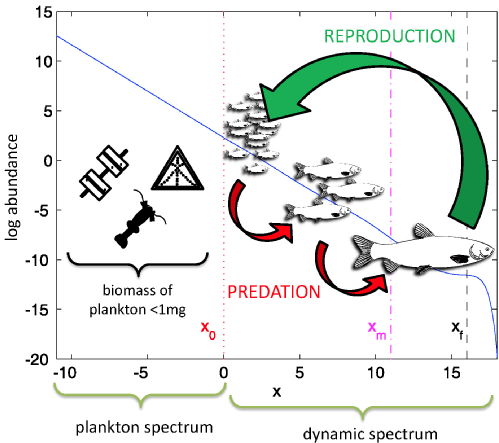Mathematical modelling of marine ecosystems
My background lies in applying mathematics to biological systems. My Ph.D. was in mathematical ecology, working with my supervisors Professor Richard Law, Dr. Gustav Delius and Dr. Julia Blanchard. My project title was "A mathematical analysis of marine size spectra", and involved the mathematical modelling of marine ecosystems; the term "size spectra' denotes classifying organisms by their body mass rather than species. This assumption emerged from the phenomena of equivalent amounts of biomass found in logarithmically increasing weight brackets in marine systems (from phytoplankton up to the largest marine organisms), and of size-based feeding (rather than species-specific) being common all along the size spectrum, from small fish larvae right up to large pelagic fish species. I studied several basic life processes such as growth, death, predation and reproduction.
This simplified the mathematics significantly, leading to equations in only two variables (body size and time). I compared classical models used to new models derived by focusing on the basic stochastic processes occurring at the individual level, and the newer models were shown to simulate life processes more accurately. I then focused on seasonal processes that occur in marine systems, namely springtime phytoplankton blooms and seasonal reproduction, and how the two processes affected the growth and survival of newborn fish larvae. This research has led to three papers being published, and research between myself and Dr. Blanchard continues to evolve.
An abstract and downloadable PDF of my thesis is available HERE.

A representation of a marine size spectrum, divided into a plankton and consumer spectrum, and incorporating both predation and reproduction into the dynamics.
Credit for image: Samik Datta, "A mathematical analysis of marine size spectra" (Ph.D. thesis).
Since arriving at NIWA in April 2017, I have continued my work looking at marine systems, focusing on modelling populations of protected species such as fur seals, and the effects of fishing on the population size of a range of fish species.
Relevant Publications
- Baird, S.J., Datta, S., Bagley, N.W., Marriott, P. (2017) Fish Resources Assessment Survey of the Arabian Gulf waters of the UAE. Chapter 8: Habitat Observations. NIWA Client Report 2017296WN: 40 p.
- Datta, S., Doonan, I. (2017) Fish Resources Assessment Survey of the Arabian Gulf waters of the UAE. Chapter 10: Stock Assessment Analyses. NIWA Client Report 2017302WN: 28 p.
- Stevens, D.W., Bagley, N.W., Datta, S., Finucci, B. (2017) Fish Resources Assessment Survey of the Arabian Gulf waters of the UAE. Chapter 11: Stock Assessments – Key species summaries. NIWA Client Report 2017334WN: 109 p.
- Samik Datta and Julia L. Blanchard (2016), 'The effects of seasonal processes on size spectrum dynamics', Canadian Journal of Fisheries and Aquatic Sciences 73(4), 598-610. [ARTICLE]
- Bethan C. O'Leary, James C. R. Smart, Fiona C. Neale, Julie P. Hawkins, Stephanie Newman, Amy C. Milman, Samik Datta, Callum M. Roberts (2012), 'Response to Cook et al. comment on 'Fisheries Mismanagement'', Marine Pollution Bulletin 64(10), 2267 - 2271. [ARTICLE]
- Samik Datta, Gustav W. Delius, Richard Law, Michael J. Plank (2011), 'A stability analysis of the power-law steady state of marine size spectra', Journal Of Mathematical Biology 63(4), 779 - 799. [ARTICLE]
- Samik Datta, Gustav W. Delius, Richard Law (2010), 'A jump-growth model for predator-prey dynamics: derivation and application to marine ecosystems', Bulletin Of Mathematical Biology 72(6), 1361 - 1382. [ARTICLE]

Contact details
Address:
Room A2.48,
Allen Building,
NIWA,
301 Evans Bay Parade,
Hataitai.
Wellington 6021,
NEW ZEALAND.
Tel: +64 43 860 522
E-mail: s.datta@warwick.ac.uk
